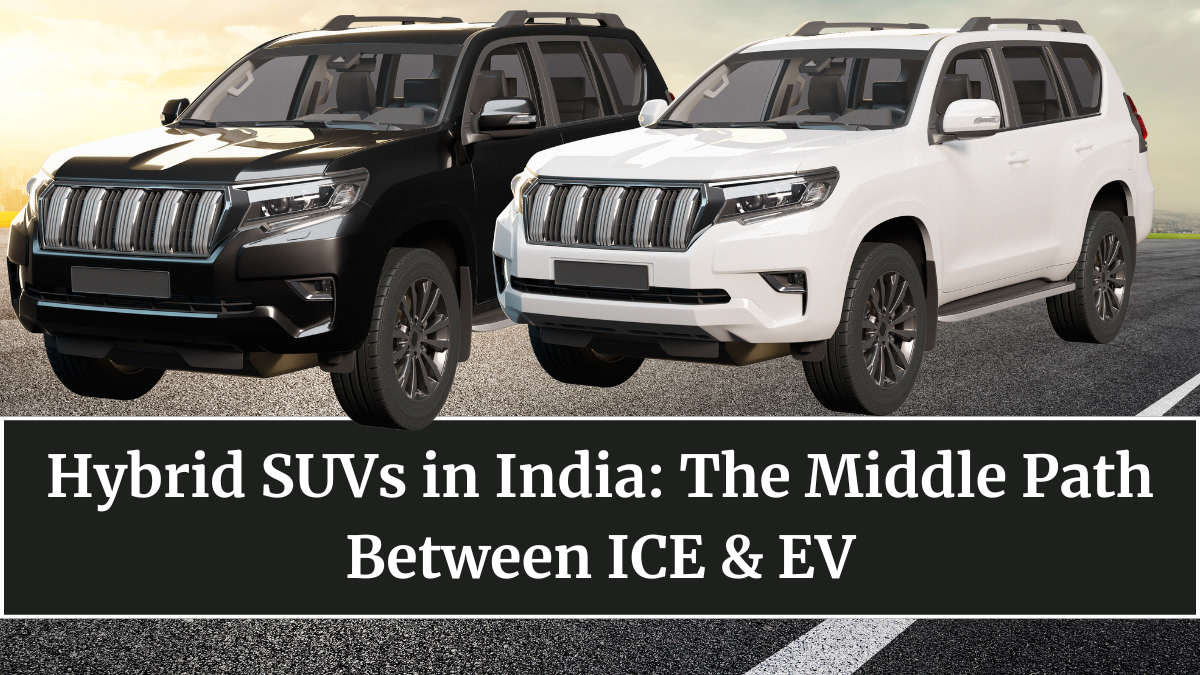In a market dominated by petrol power and a future promised to electric mobility, hybrid SUVs in India are emerging as the perfect bridge between the two worlds. For many Indian buyers, fully electric vehicles still feel like a leap — infrastructure, price, and range anxiety often hold them back. But hybrids? They strike a balance. Offering the familiarity of a fuel engine with the efficiency of an electric motor, hybrid SUVs are redefining the Indian automobile landscape in 2025.

Why Hybrid SUVs Are Gaining Popularity
The growing hybrid SUV trend in India reflects changing consumer priorities. Buyers today want fuel efficiency, low emissions, and reliability — without the inconvenience of charging or high EV prices. Hybrid technology, which combines an internal combustion engine (ICE) with an electric motor, delivers exactly that.
These vehicles intelligently switch between petrol and electric power depending on driving conditions, offering better mileage in cities and smooth long-distance performance on highways. With rising petrol prices and government focus on greener mobility, hybrids are becoming a popular compromise for Indian families and professionals alike.
Leading Hybrid SUV Models in India
India’s SUV market is already seeing a wave of hybrid launches from major automakers eager to capture this growing segment. Here are some of the most talked-about models in 2025:
| Model | Type | Approx. Mileage | Price Range | Highlights |
|---|---|---|---|---|
| Toyota Urban Cruiser Hyryder | Strong Hybrid | 27–28 km/l | ₹11–19 lakh | Self-charging tech, e-Drive mode |
| Maruti Suzuki Grand Vitara Hybrid | Strong Hybrid | 27 km/l | ₹10.7–19 lakh | Shared platform with Toyota, AWD option |
| Honda Elevate Hybrid (Expected) | Strong Hybrid | ~25 km/l | ₹12–17 lakh (est.) | Honda’s e:HEV tech |
| Hyundai Creta Hybrid (Upcoming) | Mild Hybrid | ~21 km/l | ₹13–18 lakh (est.) | Turbo petrol hybrid system |
| Kia Seltos Hybrid (Planned) | Mild Hybrid | ~20 km/l | ₹13–19 lakh (est.) | Efficiency-focused performance |
These models appeal to both eco-conscious drivers and those seeking lower running costs without sacrificing SUV comfort and capability.
The Hybrid Advantage in India
Hybrid SUVs bring a number of tangible benefits for Indian buyers:
-
No range anxiety: Unlike EVs, hybrids don’t depend solely on charging infrastructure.
-
Fuel savings: Switching between engine and electric power can reduce fuel use by up to 30%.
-
Lower emissions: Helps meet India’s tightening pollution norms.
-
Ease of transition: Drivers familiar with petrol cars adapt easily to hybrid systems.
-
Government incentives: States like Delhi and Karnataka are offering road tax rebates on hybrid vehicles.
These advantages make hybrids a smart stepping stone toward full electrification, especially in a country still building its EV charging backbone.
Challenges Holding Back Faster Adoption
Despite their advantages, hybrid SUVs in India face some headwinds. The main issue is high pricing, as hybrid technology adds cost to manufacturing. Additionally, current government subsidies under FAME-II focus only on fully electric vehicles, leaving hybrids out of financial benefits.
There’s also a lack of awareness among buyers, many of whom confuse mild hybrids (which only assist the engine) with strong hybrids (which can run independently on electric power). Clear communication and transparent marketing are essential for this segment to thrive.
The Future of Hybrid Mobility in India
The future looks promising for hybrids as more automakers invest in India-specific technologies. Companies like Toyota, Maruti Suzuki, and Honda are expanding their hybrid portfolios, while Tata Motors and Hyundai are developing flexible platforms that can support both hybrid and electric drivetrains.
As EV infrastructure matures, hybrids will play a critical role in bridging the gap — ensuring the transition to cleaner mobility happens smoothly. For many, they represent the most practical choice in 2025 — efficient, reliable, and future-ready without the wait for a charging plug.
FAQs
What is a hybrid SUV?
A hybrid SUV uses both an internal combustion engine and an electric motor to power the vehicle, improving fuel efficiency and reducing emissions.
Are hybrid SUVs better than EVs in India right now?
For many buyers, yes. Hybrids don’t rely on public chargers, making them more convenient while still offering strong fuel savings.
Which hybrid SUV gives the best mileage in India?
The Toyota Urban Cruiser Hyryder and Maruti Suzuki Grand Vitara Hybrid lead the segment with around 27–28 km/l.
Are hybrids eligible for government subsidies?
Currently, FAME-II incentives apply only to fully electric vehicles, not hybrids. However, some states offer tax benefits for hybrid cars.
Is hybrid maintenance expensive?
Not significantly. Modern hybrids have robust systems designed for long-term reliability, and servicing costs are comparable to petrol vehicles.
Click here to know more.
